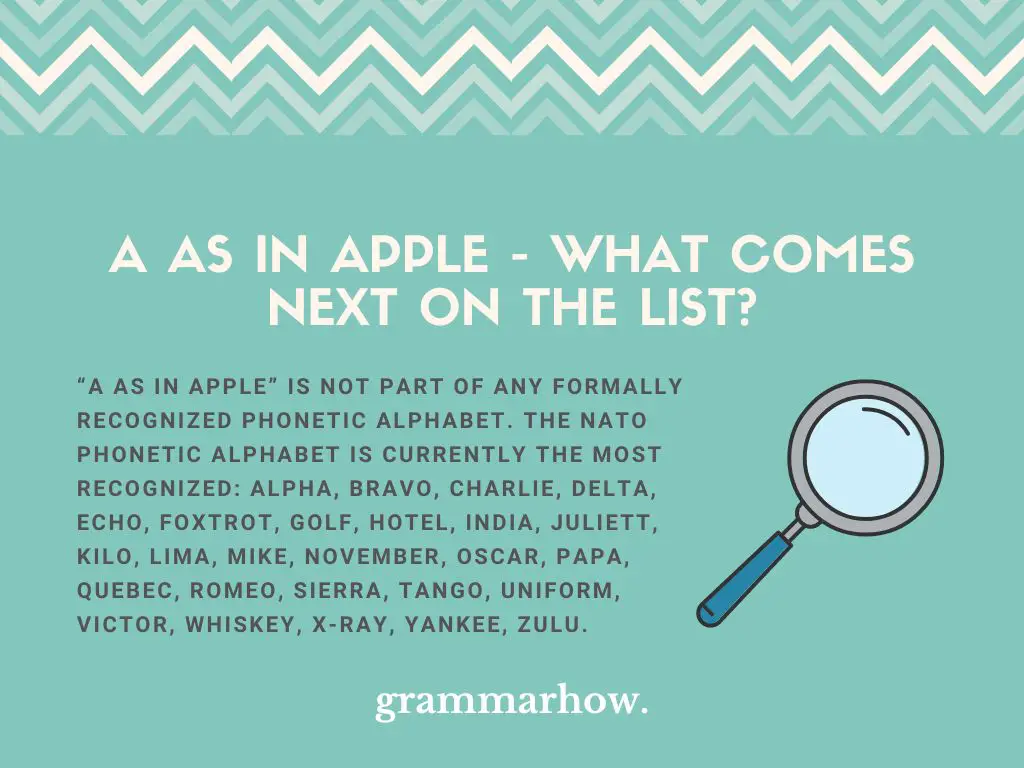What comes next after “A as in Apple?”
When you’re talking on the phone and want to make the spelling of a word clear, you might use the phonetic alphabet for clarity. Is “A as in Apple” part of a recognized list of phonetic alphabet? If so, what comes next?
A as in Apple – What Comes Next on the List?
“A as in Apple” is not part of any formally recognized phonetic alphabet. The NATO phonetic alphabet is currently the most recognized: Alpha, Bravo, Charlie, Delta, Echo, Foxtrot, Golf, Hotel, India, Juliett, Kilo, Lima, Mike, November, Oscar, Papa, Quebec, Romeo, Sierra, Tango, Uniform, Victor, Whiskey, X-ray, Yankee, Zulu.

While “A as in Apple” is a term that will ring a bell for many of us, there is no standard phonetic alphabet that begins this way. It was briefly used by the British Royal Navy during World War I, but has clearly dipped in popularity ever since.
If you’re trying to communicate with someone over the phone, you could probably come up with your own simple words to let the person on the other side know that you’re, in fact, saying “b for boy” and not “d for dog”.
However, there are standard phonetic alphabets that many people across the world have been taught how to use as a reference point. The most popular and recognized of these is NATO.
NATO Phonetic Alphabet
The NATO phonetic alphabet has existed in its current form since 1956. It is designed to be used over radio and telephone and the words were specifically chosen to be distinctive from each other.
It is internationally recognized and used as the standard by the International Civil Aviation Organization (ICAO) and the International Telecommunication Union (ITU). The words are intended to be easy to understand across language barriers.
Here is the complete NATO alphabet:
- A as in Alfa
- B as in Bravo
- C as in Charlie
- D as in Delta
- E as in Echo
- F as in Foxtrot
- G as in Golf
- H as in Hotel
- I as in India
- J as in Juliett
- K as in Kilo
- L as in Lima
- M as in Mike
- N as in November
- O as in Oscar
- P as in Papa
- Q as in Quebec
- R as in Romeo
- S as in Sierra
- T as in Tango
- U as in Uniform
- V as in Victor
- W as in Whiskey
- X as in X-ray
- Y as in Yankee
- Z as in Zulu
“Alfa” and “Juliett” are both intentionally misspelled to avoid mispronunciations.
US Law Enforcement Phonetic Alphabet
Officially, law enforcement across the US adopted the NATO alphabet in 1974. Unofficially, most departments still use a variation of the old APCO phonetic alphabet, also known as the LAPD radio alphabet.
In this version, many of the longer words found in NATO are replaced with shorter ones that will be quicker to say in an emergency.
There is some localized variation in the words used but this is the most popular version:
- A as in Adam
- B as in Boy
- C as in Charles
- D as in David
- E as in Edward
- F as in Frank
- G as in George
- H as in Henry
- I as in Ida
- J as in John
- K as in King
- L as in Lincoln
- M as in Mary
- N as in Nora
- O as in Ocean
- P as in Paul
- Q as in Queen
- R as in Robert
- S as in Sam
- T as in Tom
- U as in Union
- V as in Victor
- W as in William
- X as in X-Ray
- Y as in Young
- Z as in Zebra
In contrast, law enforcement in the UK does use the NATO alphabet.
Which Should I use in the UK?
In the UK, you should use the NATO phonetic alphabet. This is the standard phonetic alphabet used and will be understood by most people. Operators working in UK call centers will normally have been trained to use this alphabet.
Which Should I Use in the US?
You should use the NATO phonetic alphabet in the US, as this is the officially adopted version. However, you could also use the APCO/LAPD alphabet. This is the version that is still used by the majority of law enforcement across the states.
Which Should I Use Outside the UK and the US?
The NATO alphabet is an internationally recognized standard used by NATO’s 30 member states and beyond. It is the version most likely to be understood by anyone you are communicating with, despite the country they live in. Both Australia and Canada use this version.
Final Thoughts
Although people may frequently use the word “apple” to indicate the letter “a”, there is no official phonetic alphabet beginning this way. The most commonly used, internationally recognized, phonetic alphabet is NATO, which begins “A as in Alfa”. This alphabet has remained stable since 1956.

Martin holds a Master’s degree in Finance and International Business. He has six years of experience in professional communication with clients, executives, and colleagues. Furthermore, he has teaching experience from Aarhus University. Martin has been featured as an expert in communication and teaching on Forbes and Shopify. Read more about Martin here.
